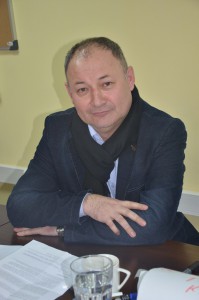Kazakhstan was one of the first countries to implement the newly available technologies for rapid diagnostic testing. Dr. Malik Adenov, Chief Doctor of the National TB Center in Kazakhstan, tells about the need of a programmatic approach to work towards sustainable TB control.
KNCV has been involved in TB control in Kazakhstan since 1997. In 2014, we gave technical and financial support to the development of guidelines for the Programmatic Management of Drug-resistant TB (PMDT). “National PMDT guidelines are very important to us,” says Dr. Adenov. “The problem of MDR-TB in Kazakhstan is very relevant at the moment. At the same time there is the opportunity for implementing new technologies: technologies for the management of MDR-TB, for laboratory diagnostics, rapid diagnostic tests, and for new approaches to the treatment of MDR-TB. All these developments together mean that new guidelines are necessary.” The GeneXpert program is working very well: from initially four Xpert MTB/RIF machines there are now 24 machines for rapid diagnostic testing in the country. The NTP plans to place more Xpert machines close to the population. “Building on the good results we have achieved, we now know the direction we have to take. For further implementation we will be able to work very sustainably. A plan for TB and MDR-TB control is being implemented now without external financial support. This is possible because the Kazakhstan government continues its comprehensive support to the TB control system.” An important aspect of the fight against TB is the development of a national policy for ambulatory or outpatient care. Dr. Adenov: “Initially, providing outpatient care was a huge issue. There was a fear of losing oversight and control of the whole cycle of patient treatment. Specialists were concerned that this would result in lower cure rates. Another fear was that government financing would be cut if there was a shift to outpatient service delivery. Generally, all budget allocated to services are related to TB bedside care. During the implementation of the patient-centered pilot project in the Akmola region, a system was developed in which the budget was reallocated to ambulatory care, without the need for additional funds. This is yet another example of a sustainable approach. The NTP and the Ministry of Health have now decided to include this system in the national strategy.”
“Another important new idea emerging from the Akmola project is the need for psychosocial support for patients. Local government has decided to increase funding so that we can continue to keep track of patients and motivate them while they are on treatment at home. We hope to develop more new models of care in pilot sites, adapt them to local circumstances and then apply them to whole country. To apply what we have learned to the whole country is a responsible process, but we are now ready to take that on.”
